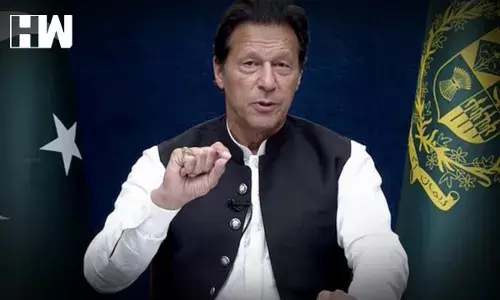New Delhi: Imran Khan, Pakistan’s prime minister, is facing the most difficult task of his political career, as he may become the first leader in the country to be deposed by a no-confidence vote. At 10 a.m., the national assembly will vote on his destiny (local time).
When a crucial coalition partner stated its seven legislators would vote with the opposition, Mr Khan’s Pakistan Tehreek-e-Insaf party effectively lost the majority in the parliament earlier this month. More than a dozen members of the ruling party have already signalled that they will vote against the bill.
The opposition says it has more than 172 votes in the 342-seat assembly, which needs a quarter of members present for a quorum.
Prime Minister Imran Khan yesterday night urged Pakistanis to take to the streets on Sunday to peacefully protest against a “imported administration,” urging them to safeguard the country’s sovereignty.
PM Khan claimed that foreign powers are trying to topple his government and Pakistan’s lawmakers are being traded like sheep to accomplish this.
“We got to know that US diplomats were meeting our people. Then we got to know about the entire plan,” he said, adding that he is not at the liberty to publicly release all the details owing to national security concerns.
He also slammed the country’s media, accusing it of “celebrating” the government’s fall.
PM Khan said foreign powers want a pliable PM and that’s why they are trying to push him out. He has called the political situation an attack on the sovereignty of Pakistan. “We are 22 crore people. It is insulting that someone from outside is ordering this to 22 crore people,” he said.
The Supreme Court on Thursday overturned a move by PM Khan to block a parliamentary vote seeking to oust him. The dismissal of the no-confidence motion against Prime Minister Imran Khan was “unconstitutional”, the Pakistan Supreme Court said. It reconstituted the national assembly and ordered the Speaker to call a session.
If Mr Khan loses, he will be the first Prime Minister to be removed through a no-trust vote. The opposition could then nominate its own Prime Minister and hold power until August 2023, by which date fresh elections have to be held.
No Prime Minister has ever seen out a full term in Pakistan since its inception.
As an independent media platform, we do not take advertisements from governments and corporate houses. It is you, our readers, who have supported us on our journey to do honest and unbiased journalism. Please contribute, so that we can continue to do the same in future.

